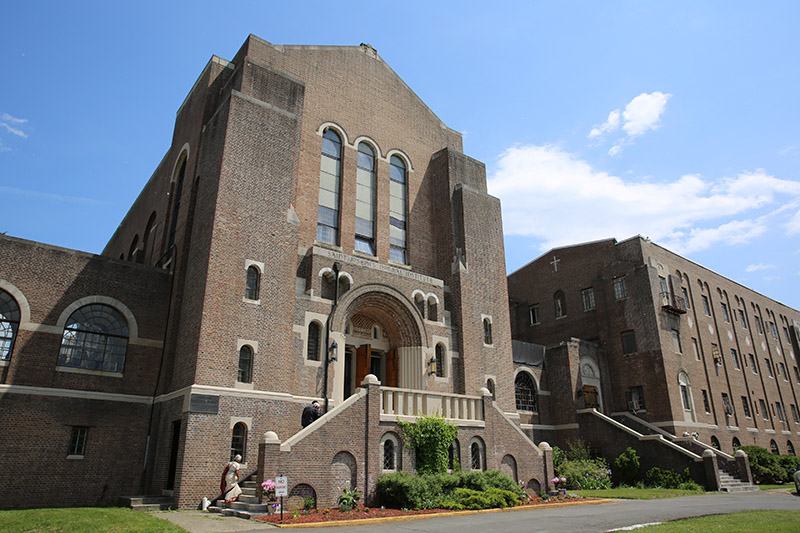Spotlight: Unification Theological Seminary Celebrates 46 Years

Forty-six years ago today, on September 20, 1975, the Unification Theological Seminary (UTS) opened its doors in Barrytown, New York, to the first class of 56 students, who enrolled in a two-year religious education program.
“I strongly believe that the inaugural convocation of the Unification Theological Seminary is the laying of the cornerstone of the Earthly Kingdom of God,” said the late Rev. Dr. Sun Myung Moon, co-founder of UTS, during the seminary’s opening convocation at the Barrytown Main Chapel. “We must change our direction from the established theologies which are deprived of life and spirit and turn to a new theology with a dynamic vitality and lifestyle in which God can directly participate.”
Previously a Christian Brothers boarding school of St. Joseph’s Normal Institute purchased in 1974, UTS added a three-year Divinity Program to better prepare students for ministerial leadership by 1980.
Over the first years, Rev. Moon often visited the campus, “sharing with students in the classroom or on long walks around the 250-acre campus,” recalls the seminary’s website detailing its rich history. “He initiated a tradition of fishing in the Hudson River, personally showing the students how to prepare fishing nets, and guided the creation of a soccer field and scenic pond.”
UTS’s first faculty—hailing from Methodist, Reformed, Roman Catholic, Greek Orthodox and Jewish faiths—represented the breadth of the Judeo-Christian tradition and reflected Rev. Moon’s commitment to bring unity among all people, with the seminary’s interreligious body being a central part of this vision and the school’s history.
In the late 1970s and early 1980s, Unificationist leaders joined a roster of distinguished scholars who visited UTS for various interfaith programs. Ecumenical conferences and other initiatives attracted scholars and religious leaders from a wide range of denominational backgrounds. Esteemed participants included Harvey Cox of Harvard University; Martin Rumscheidt, President of the Karl Barth Society; Father John Meehen, President of Maryknoll Seminary; psychologist Albert Ellis; folklorist Morton Smith from Columbia University; Augustine scholar Ernest Fortin from Boston College; Buddhist scholar David Kalupahana from the University of Hawaii; Islamic scholar and martyr Isma’il al-Faruqi from Temple University, and the Hasidic singing rabbi Schlomo Carlebach, among countless others.
UTS developed an array of ecumenical and interreligious organizations that extended the wider movement’s reach to scholars and religious leaders, as the 21st century ushered in a new era of opportunity and expansion for the seminary. An extension center in New York City was established in 2000, and a Doctor of Ministry program began in 2006 followed by an M.A. in Religious Studies in 2009. UTS was then granted state approval to relocate its main campus to 4 West 43rd Street in Manhattan in 2018. The seminary also launched a robust online program, which has inspired a fresh wave of young Unificationist scholars worldwide.
“From its founding and through the mid-1990s, UTS was a place to prepare Unification leaders,” said UTS President Dr. Thomas Ward, a 1981 graduate who was appointed its sixth president in 2019. “UTS continues to be a vibrant and growing educational institution.”
Over the course of five presidential administrations, and many overhauls, UTS has remained steadfast to Rev. Moon’s vision of strengthening community relations, expanding academic programs, and preparing a new generation of leadership. The Barrytown property has hosted matching convocations, Marriage Blessing education workshops, and sports festivals over the years as well.
With fully accredited master’s and doctoral degrees, more than 1,500 UTS graduates have pioneered a range of projects and initiatives, authored books and other literature, and become heads of national and global enterprises and endeavors. “The seminary’s Barrytown years are a testament to the vitality and adaptability of UTS as an institution,” said Dr. Ward.
You can learn more about the Unification Theological Seminary here.
Comments are welcomed and encouraged on this site, but there are some instances where comments will be edited or deleted. Please see our comments policy here.
